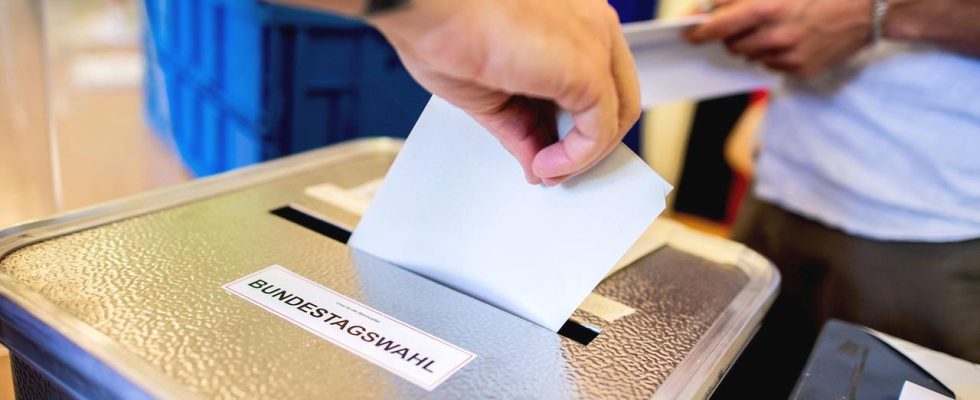faq
Voters in 455 Berlin voting districts are called upon to cast their vote again for the Bundestag. Who can vote again? And what does that change about the composition of the Bundestag? An overview.
Who can vote?
Around 590,000 Berliners are called to vote again. Since the original election was more than six months ago, a new voters’ register was created. What counts is who is eligible to vote now – and not who was eligible to vote in 2021.
Anyone who has moved from Berlin is not allowed to take part. On the other hand, people who have only recently lived in the capital or have just come of age are eligible to vote – always provided that they live in an affected voting district, i.e. certain neighborhoods or streets.
This is particularly likely in Berlin-Pankow: There, more than 80 percent of those eligible to vote will be called again.
This shows that a repeat election is always a dilemma and raises new questions of justice: Some voters will contribute a total of two votes to the Bundestag. Others will no longer be represented at all because, for example, they have moved from Pankow to Köpenick, which is hardly affected.
Who is running and will the ballot papers look the same as in 2021?
In principle, according to the Federal Election Act, a repeat election will take place with the same nominations. So anyone who was a direct or list candidate in 2021 will also be a candidate in 2024.
There are only a few exceptions: for example, deceased people cannot remain on the ballot. Name changes are also permitted, for example if a candidate has since married or acquired a doctorate.
New parties or candidates will not be admitted to the February election. Applicants who have left a party or changed parties are also on the ballot for their old party. This could affect left-wing politicians if they now get involved with the Sahra Wagenknecht alliance.
Is it possible for the direct mandate to change in a constituency?
This is mathematically possible in several constituencies. It is most likely in Pankow and Reinickendorf.
In Pankow, Stefan Gelbhaar won for the Greens with a four percent lead over the SPD candidate. Because a large number of people vote again, the result can be very different.
“We want to defend the first Green direct mandate in East Germany,” said Gelbhaar during the election campaign. “The competitors, especially the CDU and SPD, are not sleeping.” It is unclear who will be the main competitor – if the federal trend is followed, the Union could also move in.
In Reinickendorf there are not so many voting districts where the vote is repeated, but the result at the time was extremely close: Monika Grütters from the CDU was 1.4 percent ahead of Torsten Einstmann from the SPD. “I actually think I have a chance,” said Einstmann.
The two directly elected so far, Gelbhaar and Grütters, are also secured via the state list anyway. That means: No matter how it turns out – they are back in the Bundestag. But for the state parties and individual parliamentary groups it could be a matter of one seat more or less.
What role does it play? Voter turnout?
Berlin’s state returning officer Stephan Bröchler hopes for a value of around 60 percent, like in the repeat of the House of Representatives election in February 2023. “I would like that too, but I’m afraid that we won’t quite reach this dimension,” said Berlin political scientist Thorsten Faas from the dpa news agency. There is too little at stake, and the election campaign and the media coverage were “very dutiful”.
Faas predicted little voter interest in January: “Voter turnout in the 455 voting districts will be dramatically lower than in 2021.” At that time it was around 75 percent. For 2024, he would predict 40 percent voter turnout, said Faas. “Berlin’s representation in the Bundestag will be correspondingly lower.”
“All Berlin state parties have an interest in ensuring that it is not a ghost election,” said Stefan Gelbhaar from the Greens. Because it’s not just about direct mandates from Berlin. In addition to the first vote, the second vote is also repeated and then converted to the entire federal territory. Berlin could lose mandates if participation is weak.
Particularly at risk are MPs who were the last to enter the Bundestag via their state list: in the case of the Greens, this concerns Nina Stahr, in the case of the AfD, Götz Frömming and in the case of the SPD, successor Ana-Maria Trăsnea has to tremble.
Can there also be effects outside of Berlin?
There can be “cross-state shifts in the distribution of seats,” as the Berlin state election committee puts it in technical terms: “New mandate gains or losses can also arise in other federal states.”
Mandates that Berlin regional associations lose could therefore go to their party colleagues in other federal states. There are even calculations according to which members of other federal states lose their mandate under certain conditions.
How quickly will the Bundestag change?
It normally takes up to six weeks after an election for the new parliament to meet. This time the legislation simply continues. When the final result is known, the Bundestag’s Council of Elders will decide “immediately ex officio” who will lose their seat, according to the Federal Election Commission.
“A lot of change would come down on me,” said SPD candidate Torsten Einstmann. His job in a federal ministry would have to be suspended.

